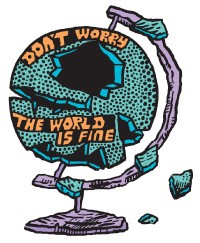|
|
When can we stop saying probably?
 Illustration: Jody Barton at Big Active
When people offer their opinion on the changes in climate in the Arctic, it is generally accompanied by ”will probably...”. Most people dislike expressing themselves too categorically when something cannot be concluded with certainty. When will we stop saying "probably"? When can we say "absolutely definitely"? We don't know. We've never been here before, and we don't know for certain what will happen. We cannot be absolutely certain that the changes in climate will take place with the force and the speed which scientists believe; maybe they will be quicker, maybe slower. However, based on scientific investigations, we can assume with great probability. Is it so vital to know with absolute certainty? We can act nevertheless.
Illustration: Jody Barton at Big Active
When people offer their opinion on the changes in climate in the Arctic, it is generally accompanied by ”will probably...”. Most people dislike expressing themselves too categorically when something cannot be concluded with certainty. When will we stop saying "probably"? When can we say "absolutely definitely"? We don't know. We've never been here before, and we don't know for certain what will happen. We cannot be absolutely certain that the changes in climate will take place with the force and the speed which scientists believe; maybe they will be quicker, maybe slower. However, based on scientific investigations, we can assume with great probability. Is it so vital to know with absolute certainty? We can act nevertheless.
What can we lose by not doing anything? If we crisis maximise a little, the answer is everything! Species disappear, deserts spread, the sea rises, nations go to war over water reserves, millions of people are forced to flee. However, we do not know definitely whether these things will take place – before they do so.
Even if you could not care less whether close on three thousand polar bears near the North Pole perish, it may be useful to know that the polar bear can be looked upon as an example species. It is quite simply an indicator that something is wrong somewhere. Moreover, it is like this with much of the arctic ecosystem. To reduce the problems, we must act on the basis of ”probably” and the precautionary principle.
|



|